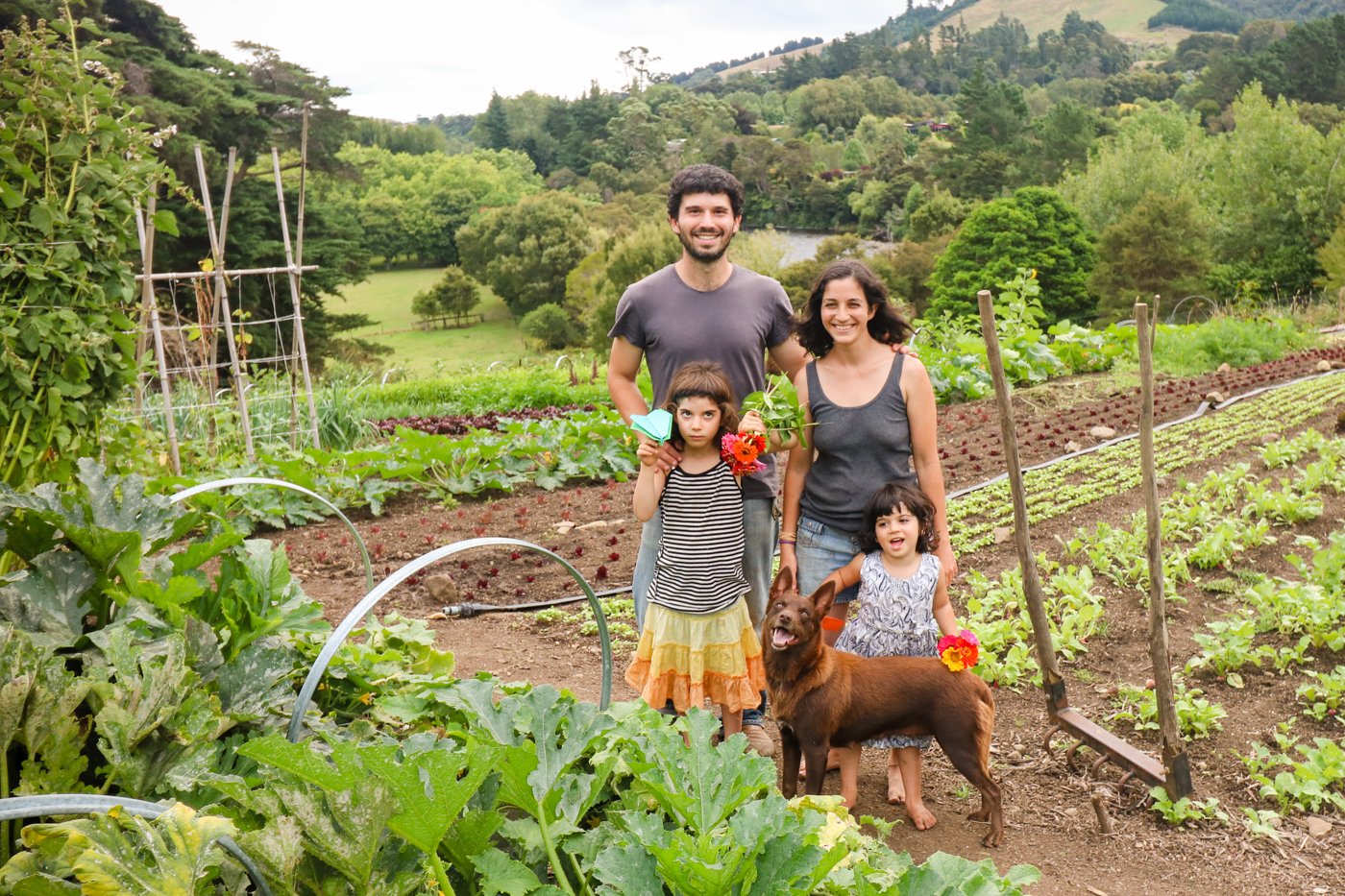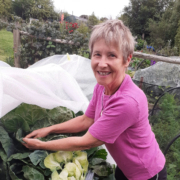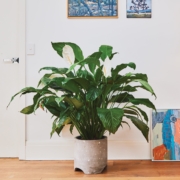Super natural growing power
We hope you enjoy this free article from OrganicNZ. Join us for access to exclusive members-only content.
I’ve seen many small family-run market gardens in my time but none aspiring to an annual turnover of $100,000. I remained skeptical until I visited Niva and Yotam Kay from Pakaraka Permaculture.
In their first season, the annual turnover was $20,000. The second season brought in $50,000 and last year it was $90,000. They also teach workshops so beginner market gardeners can skip the mistakes they made and start at the $50,000 annual turnover point.
Niva and Yotam are originally from Israel and, after travelling the world to explore sustainable living best practices, they founded Pakaraka Permaculture in the Coromandel’s Kauaeranga Valley. Now parents of two children, they share land with organic visionaries Jeanette Fitzsimons and Harry Parke from Pakaraka Farm.
Making the most of it
“It’s not the best site [for growing vegetables], but we want to show what is possible,” says Yotam. “Perfect sites are rare anyway, most of them being under dairy at the moment,” says Niva.
Limitations they’re working with include slope (they learned very fast that it’s impossible to sow directly on sloping ground), difficult access (for bringing materials on site), a high wind zone, and shade from nearby mature bush, mostly from an ancient kahikatea tree. Some garden beds are off-limits for sun-loving vegetables as a result.
At the beginning Niva and Yotam were working 12–14 hours a day. This was never going to be sustainable, especially with young children in the mix. They got smart about what systems worked for them and invested in key infrastructure like the cool room and good quality tools that made a huge difference in the way they structured their work days.
Currently only 2–3 hours a month are spent weeding. One of their workshop attendees wrote in their feedback: “I would have liked to try using the hoe, but there were no weeds!”

Certified organic
Pakaraka Permaculture market garden is part of a group of organic growers in the valley who are certified with OrganicFarmNZ (OFNZ).
“We love the pod system because as a pod we learn from each other, and share resources, such as bulk orders. There is a lot of paperwork and tracking to be done, but our certification manager is very helpful with any questions we have,” Niva explains.
“Our wholesale clients appreciate it that we are certified organic, and it also helped establish our difference at the markets and give us an edge,” says Niva.
Pakaraka Farm as a whole has been certified organic for over twenty years; Harry and Jeanette grow chestnuts, olives, pecans and raise livestock.
Go forth and multiply
With just under sixty garden beds, Niva and Yotam standardised the beds at 15 metres long, 80 cm wide with 30 cm paths. This makes planning, reusing weed mats and moving cloches easier.
“We used to calculate plantings meticulously, but we don’t plan where we plant now. It’s wherever there is available space,” says Yotam. “We try to put different botanical families in next but there are exceptions. All that is within our main crop rotations.”
The aim is to earn $100 per square metre with 4–7 crops per bed per season. To increase diversity and to supplement the homestead’s larder Niva, Yotam and the girls have planted a food forest around the market garden area.
Most plants are under cloches at the start and end of the season. It’s taken perseverance to find the right combination of seed variety, plant care and the best garden beds to grow certain plants. Yotam and Niva had a superb bed of spinach growing when I visited in late October but that was hard won, the result of a few seasons experimenting.
“We don’t want to just do salad because that’s very boring. We want people to be able to make a whole meal from our market stall,” says Niva. As the area is prone to high winds and rainstorms, tomatoes are grown only in the large polytunnel, which is also bursting with a colourful array of microgreens.
Stewardship of the soil
With such intensive production I was curious about soil fertility management. “The key is to give back. We used three tonnes of solid fertiliser– rock dust and 50 cubic metres of compost – over the last three seasons. All certified organic,” says Yotam. Potting mix is brought in too.
A recent soil test came back with a note from the technician saying: ‘Wow, we don’t really see such healthy, well mineralised soil’. The pride at this proof of holistic land stewardship is evident. And with good reason – these folks work hard.
Secrets of success
What about that amazing turnover of $90,000 of produce from a quarter acre? I asked them what the secret was. In short, SYSTEMS! See the sidebar for their recommendations.
The whole set-up looks very organised. There is a covered work area that acts as garden HQ, with a whiteboard illustrating garden bed planning, propagation calendar and charts on clipboards. It’s a business. A well-thought-out one always striving to do better.
“We’re improving our systems all the time; keeps it exciting. There is always something new to try. We encourage people to get comfortable with using current technologies in ways that allows growing food to take care of the earth and live a good life,” says Yotam.
Connecting with customers
Pakaraka Permaculture sell their produce to the organic shop in Thames, and to five cafés and restaurants year-round. They also sell at two markets for 6–7 months of the year: Thames market on Saturdays and Clevedon in southeast Auckland on Sundays. Niva’s face lights up when she talks about meeting their customers at the stall. It’s a transaction that is much more than money.
The focus is on retail sales rather than wholesale to maximise income and connection with people. Niva talks about buying from small growers being about the relationship; each customer becomes part of the Pakaraka story. “Everyone is yearning for connection.” When they started, three-quarters of their produce went to cafés and restaurants, with a quarter going to markets. Now it’s the reverse, and their public profile and earnings reflect the wisdom of that decision.

Earth care, people care, fair share
Yotam and Niva’s interest in permaculture is broader than gardening. “Our philosophy is to give more than we take,” says Niva.
She outlines permaculture ethics: earth care, people care, fair share. Niva and Yotam apply that to all aspects of their lives, especially their gardens and workshops. This holistic approach to permaculture as life is exemplified by the farm as a whole, which they say is carbon negative. The no-dig system is not just about less work for them, it’s valued for capturing the carbon in the ground. Market runs are done in their electric vehicle (a Nissan Leaf) and tools are run off the solar panels.
Passing on the knowledge
Their education work, including gardening and homesteading workshops, makes up 20–30% of their total income. Niva and Yotam are passionate about teaching what they’ve learnt and about contributing toward a more sustainable world. “We don’t want to be just the model, that’s not the point,” says Niva.
When I asked if they were afraid of breeding competition, Yotam replied no without hesitation. “We know there is much more demand than we can produce and if we want to push this mass movement, we need thousands more gardens like this. It will bring healthy food to the people, healing to the land, totally win-win.” Yotam adds that they absolutely see that small-scale farming can feed New Zealand.
“We’re proof that there is a different way of growing. We don’t have supernatural powers. We work hard. We’re persistent,” says Yotam.
Business skills had to grow alongside the market garden. Cashflow was hard when they were starting out. The usual twentieth of the month invoice payout was challenging for a small business. They’ve learnt to stipulate that invoices are to be paid within seven days.
A joyous life
In the winter Niva and Yotam’s combined working hours can go down to 40 hours a week. In the summer this goes up to 70–80 hours combined. Much of the profit goes back into the market garden and farm. There is no daily commuting, they can be available for their children, and they’re part of a global call for sustainable living.
Factor in the flexibility, the joy of doing what you love, being able to grow and share good food together daily and you have the ingredients of a very rich lifestyle as well as a successful market garden.
Pakaraka Permaculture at a glance
- Location: Kauaeranga Valley, just outside Thames in the Coromande
- Land area: quarter-acre+ market garden, within 215 acres of land co-owned with
Pakaraka Farm - Soil type: Waihi ash, clay sub-soil
- Crops: Range of greens, strawberries, cucumbers, eggplants, tomatoes and more
- Annual turnover: $90k from market garden – not including education work www.pakarakafarm.co.nz
Tips for budding market gardeners
Pakaraka Permaculture share their recommendations.
- Weed management system. Eliminate perennial weeds before starting and use weedmats. Then you’ll have a blank slate to begin with. Keep on top of weeds using the right tools – take the weeds down to ground level with a sharp tool.
- No-dig cultivation system. Use appropriate tools for bed prep and maintenance. Niva and Yotam use a broadfork or forksta to aerate the soil, hoes and a bed rake.
- Cloche system. It’s important to use good quality cloches to protect crops and extend the season at either end. Niva and Yotam are on their fifth year of using the same cloches.
Anissa Ljanta is a writer, not-for-profit professional, seamstress, blogger and online content specialist and keen gardener currently doing battle with snails on the wild west coast near Auckland. growmama.blogspot.com






